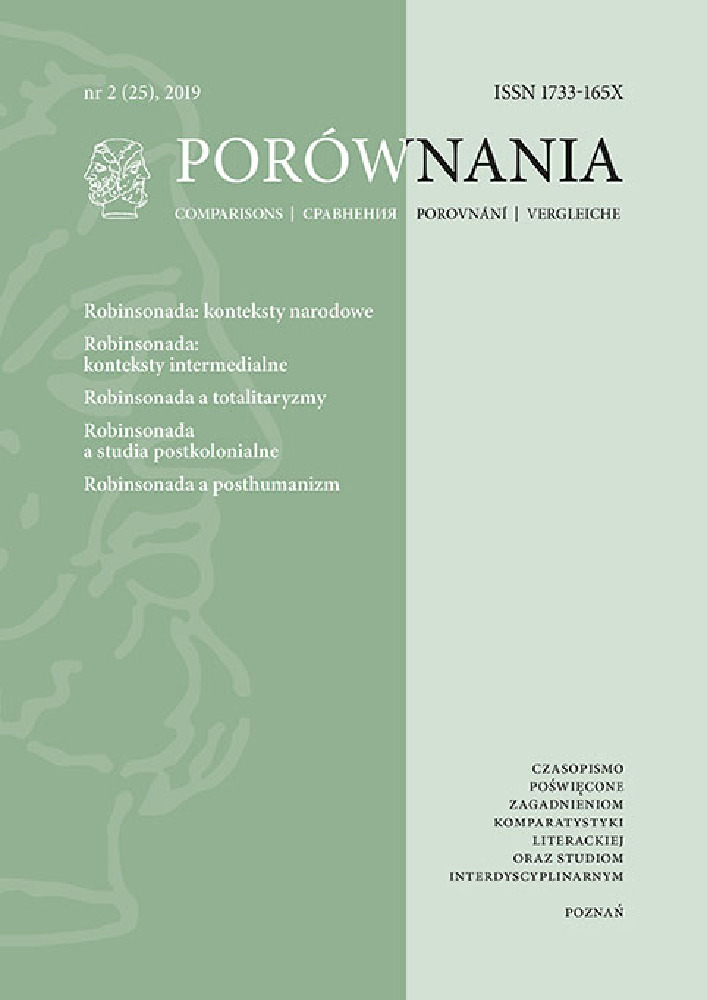Abstract
The article discusses Jacques Offenbach’s operetta Robinson Crusoe, whose libretto is based on the great 1719 novel by Daniel Defoe by the same title. The adaptation by French librettists in the late 19th century is a far cry from the original narrative. The novel, an epic hymn to human resourcefulness and resilience, became a light comedy with a trite story line and without a deeper message. The analysis of two formally very different texts with the same protagonist brings about a conclusion of an innate impossibility of translating a grand novel to a comedy stage.
References
Crichton, Ronald. “Robinson Crusoe”. The Musical Times, May (1982). S. 340.
Dean, Winton. “Robinson Crusoe”. The Musical Times, May (1973). S. 508-509.
Defoe, Daniel. Przypadki Robinsona Crusoe. Przeł. Józef Birkenmajer. Warszawa: Państwowy Instytut Wydawniczy, 1986.
Faris, Alexander. Jacques Offenbach. Londyn: Faber & Faber, 1980.
Gier, Albert. Das Libretto. Teorie und Geschichte einer musikoliterarischen Gattung. Darmstadt: Wissenschaftliche Buchgesellschaft, 1998.
Hutcheon, Linda. A Theory of Adaptation. With Siobhan O’Flynn. New York: Routledge, 2013.
Kamiński, Piotr. Tysiąc i jedna opera. T. 1-2. Warszawa: Polskie Wydawnictwo Muzyczne, 2008.
Kracauer, Siegfried. Jacques Offenbach i Paryż jego czasów. Przeł. Andrzej Sąpoliński. Warszawa: Państwowy Instytut Wydawniczy, 1992.
Kronika opery. Oprac. zespół. Przeł. Jolanta M. Michasiewicz. Warszawa: Wydawnictwo Kronika, 1993.
Lamb, Andrew. “Robinson Crusoe”. Grove Music online. Oxford University Press. Web. 30.09.2019. <https://doi.org/10.1093/gmo/9781561592630.article.O007686>
Maleszyńska, Joanna. „Biblijna przypowieść o synu marnotrawnym i jej literackie transpozycje”. Miejsca wspólne. Szkice o komunikacji literackiej i artystycznej. Red. E. Balcerzan, S. Wysłouch. Warszawa: Państwowe Wydawnictwo Naukowe, 1985. S. 221-239.
Nowicka, Elżbieta. Zapisane w operze. Studia z historii i estetyki opery. Poznań: Wydawnictwo Poznańskie, 2012.
Opera. Eyewitness Companions. Oprac. A. Riding, L. Dunton-Downer. New York: Dorling Kindersley, 2006.
Opera. Kompozytorzy, dzieła, wykonawcy. Oprac. A. Batta. Red. S. Neef. Przeł. zespół. Kraków: Konemann, 2003.
Puchalska, Iwona. Sztuka adaptacji. Literatura romantyczna w operze dziewiętnastowiecznej. Kraków: Universitas, 2004.
Ruszała, Jadwiga. Robinsonada w literaturze polskiej: teoria, typologia, bohater, natura. Słupsk: Pomorska Akademia Pedagogiczna, 2000.
Traubner, Richard. Operetta: A Theatrical History. London: Routledge, 2016.
Woolf, Virginia. Eseje wybrane. Wybór i oprac. R. Sendyka. Przeł. Magda Heydel. Kraków: Wydawnictwo Karakter, 2018.
Wysłouch, Seweryna. „Werbocentryzm – uzurpacje i ograniczenia”. Literatura i semiotyka. Warszawa: Wydawnictwo Naukowe PWN, 2001. S. 53-64.
Ziomek, Jerzy. „Przekład – rozumienie – interpretacja. Parodia jako problem retoryki”. Powinowactwa literatury. Warszawa: Wydawnictwo Naukowe PWN, 1980. S. 159-200.
License
Utwory opublikowane w czasopiśmie „Porównania”, na platformie Pressto należącej do Uniwersytetu im. Adama Mickiewicza w Poznaniu są udostępniane na licencji Creative Commons Uznanie autorstwa - Bez utworów zależnych 4.0 Międzynarodowe (CC BY-ND 4.0)
Tym samym wszyscy zainteresowani są uprawnieni do korzystania z utworów opublikowanych pod następującymi warunkami:
-
uznania autorstwa — czyli obowiązek podania wraz z rozpowszechnianym utworem informacji o autorstwie, tytule, źródle (odnośniki do oryginalnego utworu, doi) oraz samej licencji
-
bez utworów zależnych — remiksując, przetwarzając lub tworząc na podstawie utworu, nie wolno rozpowszechniać zmodyfikowanych treści.
-
brak dodatkowych ograniczeń — nie można korzystać ze środków prawnych lub technologicznych, które ograniczają innych w korzystaniu z utworu na warunkach określonych w licencji.
Uniwersytet im. Adama Mickiewicza w Poznaniu zachowuje prawo do czasopisma jako całości (układ, forma graficzna, tytuł, projekt okładki, logo itp.).
Autor zachowuje prawa majątkowe, ale udziela zgody Uniwersytetowi im. Adama Mickiewicza w Poznaniu na wykorzystanie dzieła. Autorzy tekstów zakwalifikowanych do publikacji proszeni są o wypełnienie podpisanie i przesłanie umowa (PL) agreement (EN)
Agreement for granting a royalty-free license to works with a commitment to grant a CC sub-license




